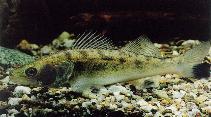| Family: |
Percidae (Perches), subfamily: Luciopercinae |
| Max. size: |
100 cm SL (male/unsexed); max.weight: 20 kg; max. reported age: 17 years |
| Environment: |
pelagic; freshwater; brackish; depth range 2 - 30 m, potamodromous |
| Distribution: |
Europe and Asia: Caspian, Baltic, Black and Aral Sea basins; Elbe (North Sea basin) and Maritza (Aegean basin) drainages. North to about 65° N in Finland. Introduced widely (Ref. 59043). Several countries report adverse ecological impact after introduction (Ref. 1739). |
| Diagnosis: |
Dorsal spines (total): 13-20; Dorsal soft rays (total): 18-24; Anal spines: 2-3; Anal soft rays: 10-14; Vertebrae: 45-47. Distinguished from congeners in Europe by the following combination of characters: 1-2 enlarged canine teeth in anterior part of each jaw; second dorsal fin with 18-22½ branched rays; and 80-97 scales on lateral line (Ref. 59043).
Description: Long slender body, without cross-bars. No spines on the gill cover (Ref. 35388). Caudal fin with 17 soft rays (Ref. 40476). |
| Biology: |
Adults inhabit large, turbid rivers and eutrophic lakes, brackish coastal lakes and estuaries. Feed mainly on gregarious, pelagic fishes. They attain first sexual maturity at 3-10 years of age, usually at 4. Undertake short spawning migrations. Individuals foraging in brackish water move to freshwater habitats. Migrations up to 250 km have been recorded. Homing is well developed, even nearby populations may be relatively isolated. Spawn in pairs at dawn or night. Spawning occurs in April-May, exceptional from late February until July, depending on latitude and altitude when temperatures reach 10-14° C on spawning grounds (Ref. 59043). Popularly fished by sport fishers. Its flesh is succulent (Ref. 30578). Utilized fresh or frozen and eaten steamed, broiled and microwaved (Ref. 9988). An individual weighing 19 kg was reportedly caught in 1959 in Starnberger, Bavaria, Germany (Peter Admicka, pers. Comm. E-mail: peter.adamicka@oeaw.ac.at). |
| IUCN Red List Status: |
Least Concern (LC); Date assessed: 01 January 2008 Ref. (130435)
|
| Threat to humans: |
potential pest |
Source and more info: www.fishbase.org. For personal, classroom, and other internal use only. Not for publication.

